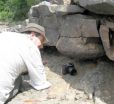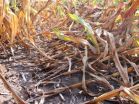(Press-News.org) COLUMBUS, Ohio – In this world, there are winners and losers – and, for your own safety, it is best to fear the winners.
A new study found that winners – those who outperformed others on a competitive task – acted more aggressively against the people they beat than the losers did against the victors.
"It seems that people have a tendency to stomp down on those they have defeated, to really rub it in," said Brad Bushman, co-author of the study and professor of communication and psychology at Ohio State University.
"Losers, on the other hand, don't really act any more aggressively than normal against those who defeated them."
Bushman said this is the first study to examine whether winners or losers were more likely to act aggressively.
There were reasons to believe either side could have been more in a fighting mood, Bushman said. Losers might be the bigger aggressors, because they would be angry against those who prevented them from feeling competent. However, other research suggests that people are more aggressive when they feel powerful, as they may when they win a competition.
These results, though, suggest "losers are the ones who get the brunt of the aggression," he said.
Bushman conducted the study with three French scholars: Dominique Muller and Emmanuelle Ceaux of Pierre Mendès-France University in Grenoble and Baptise Subra of University Paris Descartes. Their results appear online in the journal Social Psychological and Personality Science and will appear in a future print edition.
They conducted three related studies.
The first study involved 103 American college students who were told they would be paired with a partner who they would be competing against on two tasks. (In actuality, there was no partner).
In the first task, participants were shown patterns of simple shapes on a computer screen for just a fraction of a second (70 milliseconds) and they had to decide whether a dollar sign was present or absent.
After 80 trials, all students were told their scores. Half of them were told they did better than their supposed partner, and half were told they did worse. In other words, half were winners and half were losers.
The second task was a competitive reaction time task which is used to measure aggression. Participants were told that they and their partner (supposedly the same person they competed against in the first task) would have to press a button as fast as possible on each of the 25 trials and that whoever was slower would receive a blast of noise through headphones.
The winner of the task would decide how loud the blast would be and how long it would last.
Results showed that participants who won in the first competition blasted their partners longer and louder than did those who lost the competition.
"People were more aggressive when they were better off than when they were worse off than others," Bushman said.
One possible limitation of this study, Bushman said, was that participants might have thought that someone who was good at the first task would also be good at the second task. If that was true, the losers in the first task may have been afraid to act aggressively because they were afraid their partner would again win a lot of trials and punish them with loud blasts.
So in a second study, conducted with 34 French college students, the researchers repeated the same experiment, except that the researchers told participants that the two tasks tested different capacities, and that those who did well on the first task do not necessarily perform well on the second.
The results were the same as those in the first experiment, providing further evidence that winners are more aggressive than losers, Bushman said.
Another question, though, is whether winners really were more aggressive against losers, or whether losers were actually just less aggressive than normal against winners.
A third study, involving 72 French college students, answered that question by adding a control group to the study. As in the previous experiments, one group was told their partner did better than they did on the first competitive task, and one group was told their partner did worse. However, there was also a third group that told there was a computer error during the first task and they couldn't tell who was the winner.
This study also used a different measure of aggression. In an earlier part of the study, the participants filled out a "Food Preference Form" which was shared with their supposed partner, reportedly as part of a study on how people form impressions of others.
Participants were then told they were randomly assigned to drink a sweet beverage and their partner was assigned to drink a tomato juice beverage. Participants were told they could add Tabasco sauce and salt to their partner's beverage -- which they knew their partner strongly disliked from the food preference form.
Results showed that participants who were winners in the first task added more Tabasco sauce and salt to their partner's drink than losers did.
In addition, the losers acted about as aggressively as did those in the control group, who didn't know if they were winners or losers. That suggests winners do indeed act particularly aggressively, while losers aren't particularly nonaggressive.
Bushman said the fact that the findings were repeated in three different studies, in two different countries, suggest that there really is something about winning that makes people more aggressive.
"Losers need to watch out," he said.
The next step, he said, is to find out if winners act more aggressively toward everyone, or just toward people they defeat. That's the subject of an upcoming study.
###
Contact: Brad Bushman, (614) 688-8779; Bushman.20@osu.edu
Written by Jeff Grabmeier, (614) 292-8457; Grabmeier.1@osu.edu
END
According to Medicare's first public evaluation of hospitals' records on patient safety, patients are at a heightened risk for preventable conditions when going to teaching hospitals in America.
The Medicare program found that Washington Hospital Center, Georgetown University Hospital, and the Cleveland Clinic were some of the institutions having more complications than average, according to an article from The Washington Post.
The Medicare reimbursement to the hospitals are based on a number of things, some including readmission rates, how patients rate their stays, ...
While some scientists report engineering a super virulent strain of the H5N1 influenza virus, which could potentially wipe out a significant percentage of the human population, another group of researchers from the United Kingdom now reports a discovery that may one day help mitigate the deadly effects of all flu strains. This report, appearing in the March 2012 print issue of the Journal of Leukocyte Biology, describes findings that may help prevent deaths from severe flu outbreaks, especially from seemingly healthy young people. Specifically, the researchers found that ...
An international team, including a Cardiff University researcher, who previously found evidence of the Earth's earliest tree, has gone one step further.
The research team has now unearthed and investigated an entire fossil forest dating back 385 million years.
The Gilboa fossil forest, in the Catskill Mountains in upstate New York, is generally referred to as 'the oldest fossil forest'. Yet by scientific standards it has remained mythical.
Fossils of hundreds of large tree stumps (the 'Gilboa tree') preserved in the rocks were discovered in the 1920's during excavation ...
As the old adage goes, nothing in this world is certain but death and taxes. Unfortunately, in recent times this saying is more pertinent than ever, as there is now a direct and immediate link between taxes and the end of life.
Known derisively by some as the death tax, the federal estate tax (along with its cousins, the generation-skipping tax and the gift tax) can take a substantial bite out of intergenerational wealth. However, a tax relief package in effect until the end of 2012 can help you and your estate planning attorney develop an effective strategy to limit ...
CHAMPAIGN, Ill. — High corn prices are leading many growers to plant corn every year and to overuse pesticides and other bug-killing technology to maximize yields, researchers report. In many instances, pesticides are applied without scouting fields to see if they are needed, violating a bedrock principle of integrated pest management. The result is a biological diversity desert in many corn and soybean fields in the agricultural Midwest, and signs that the surviving insects are becoming resistant to several key bug-fighting tools now available to farmers.
University ...
DURHAM, N.C. -- Voting behavior cannot be predicted by one or two genes as previous researchers have claimed, according to Evan Charney, a Duke University professor of public policy and political science.
In "Candidate Genes and Political Behavior," a paper published in the February 2012 American Political Science Review, Charney and co-author William English of Harvard University call into question the validity of all studies that claim that a common gene variant can predict complex behaviors such as voting.
They use as an example a 2008 study by James H. Fowler and ...
Scientists have combined two new "designer" forms of aspirin into a hybrid substance that appears more effective than either of its forebears in controlling the growth of several forms of cancer in laboratory tests. Their report on the new NOSH-aspirin, so named because it releases nitric oxide (NO) and hydrogen sulfide (H2S), appears in the journal ACS Medicinal Chemistry Letters.
Khosrow Kashfi, Ravinder Kodela and Mitali Chattopadhyay point out that NO and H2S are signaling substances produced in the body that relax blood vessels, reduce inflammation and have a variety ...
If you have been injured in a motor vehicle accident in Utah, you probably have many things on your mind. You could be worried about:
- Paying your medical bills
- Covering your wages if you are forced to be out of work
- Getting your car repaired
- Having to pay for a rental car
Utah laws mandating specific types of car insurance coverage should allow you to rest easier. Utah is what is known as a "no-fault" automobile insurance state. This means that essentially the law is designed to keep insurance premiums lower by discouraging lawsuits between drivers. ...
New Orleans, LA – Research led by Nicolas Bazan, MD, PhD, Boyd Professor and Director of the Neuroscience Center of Excellence at LSU Health Sciences Center New Orleans, has found that a synthetic molecule protected the brain in a model of experimental stroke. Dr. Bazan was issued a patent on the molecule called LAU-0901, a low molecular weight drug that crosses the blood-brain barrier. The findings are published in the March 2012 issue of Translational Stroke Research.
During an ischemic stroke, the most common kind, the body releases signals that cause neuroinflammation ...
Diversity has become a goal for all sorts of institutions—but what it means may depend on who you ask. A new study published in Psychological Science, a journal of the Association for Psychological Science, finds that people's ideologies help determine what they count as "diverse."
Miguel Unzueta, the study's lead author, notes that "diversity" historically meant inclusiveness toward historically disadvantaged groups. Now, however, the term is commonly used to refer to people who are different in any way (even personality traits and food preferences)—and that, Dr. Unzueta ...

